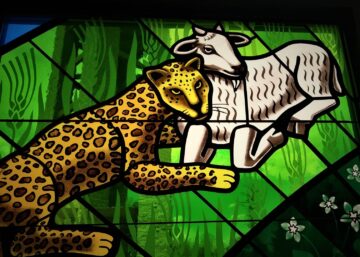In the spirit of the National Eucharistic Revival, Franciscan Sisters of Christian Charity share “The Gift of Sunday” by Archdiocese of Milwaukee Bishop James Schuerman. It was originally presented at Vespers on December 1, 2021 at the Cathedral of St. John the Evangelist, Archdiocese of Milwaukee. It is a resource deserving a larger audience.
Advent
 We are in the season of Advent, preparing ourselves for the celebration of the Nativity of the Lord. During this time of year, it is very common to invite family members and friends to our homes to share our happiness. In a special way, the Advent season reminds us that God is inviting us to share his grace and happiness.
We are in the season of Advent, preparing ourselves for the celebration of the Nativity of the Lord. During this time of year, it is very common to invite family members and friends to our homes to share our happiness. In a special way, the Advent season reminds us that God is inviting us to share his grace and happiness.
Advent is a time of vigilant waiting and hope. We Christians know that hope is essential in our lives. Hope is the reason we rise from bed in the morning, and hope keeps us motivated as we advance into the future. We are in the great season of hope, the four weeks leading to the celebration of Christ’s birth. The word “Advent” is derived from the Latin word, adventus, which means “coming” or “arrival.”
Advent, of course, is a time to prepare for the celebration of the mystery of the Incarnation of Christ. At Christmas, we celebrate the first coming of the Son of God, born of the Virgin Mary in Bethlehem. True God and true man, Jesus was born into our human condition to bring us light and life.
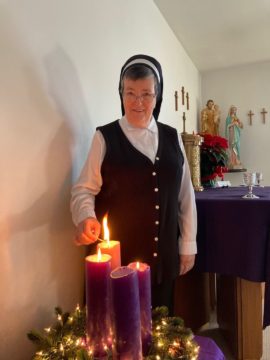 However, there is another dimension to this season. Advent is a time to recall that we should constantly be preparing ourselves for the second coming of Christ, the fulfillment of our hopes and dreams. Christian life is a life of vigilance and waiting for the coming of Christ.
However, there is another dimension to this season. Advent is a time to recall that we should constantly be preparing ourselves for the second coming of Christ, the fulfillment of our hopes and dreams. Christian life is a life of vigilance and waiting for the coming of Christ.
In one sense, the second coming of Christ refers to the end of time, when Christ will come to bring all things to completion. The Second Letter of St. Peter speaks of coming of Christ in this way:
“What we are waiting for, relying on his promises, is the new heavens and new earth, where uprightness will be at home. So then, my dear friends, while you are waiting, do your best to live blameless and unsullied lives so that he will find you at peace.” (2Peter 3:13-14)
St. Paul exhorts the faithful to be happy, hopeful, and prayerfully awaiting the coming of Christ:
“The Lord is near. Never worry about anything; but tell God all your desires of every kind in prayer and petition shot through with gratitude, and the peace of God which is beyond our understanding will guard your hearts and your thoughts in Christ Jesus.” (Philippians 4:5b-7)
The Gospels advise us to be alert while waiting for the Lord: “Be watchful! Be alert! You do not know when the time will come.” (Mark 13:33) “Stay awake, praying at all times…” (Luke 21:36a) The Gospels warn us not to let the moment overtake us unprepared, but rather to be ready to receive the Lord when he comes.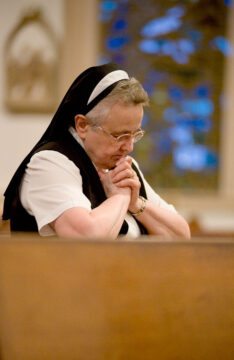
As well as referring to the end of time, the coming of Christ also refers to the many ways in which he is coming into our lives in the here and now. He comes into our lives every time we listen to the Word of God and put it into practice. He comes into our lives in a special way through the Sacramental life of the Church, especially in the celebration of the Eucharist, when we as a Christian community enter into communion with him, sharing his Body and Blood, strengthening our bond of love with him and with one another. Christ comes into our lives when we dedicate time to prayer, meditating on Sacred Scripture, sitting in silence before the Blessed Sacrament, praying the Rosary, reciting devotional prayers, or simply pouring out our hearts to God.
Another way in which Christ comes into our lives is in our encounter with other people. The Gospels invite us to see and experience Christ in our interaction with the “least” of our brothers and sisters – the hungry, the thirsty, the stranger, the sick, the imprisoned – what we do for them we do for Christ. (Matthew 25:31-46)
Advent reminds us of the need to be attentive to the many ways in which Christ makes his presence known. To be conscious of his presence requires vigilance and attention to the ways in which he touches our lives – in the Word of God proclaimed, in the Sacraments we share, and in our encounter with others, especially those most in need.
Advent: Active Waiting
As I mentioned above, Advent is a season with two points of emphasis. It is a time of preparation for Christmas, focusing on the birth of the Lord. It is also a time of joyful waiting for the second coming of the Lord.
 Years ago, I worked as a missionary priest in the Dominican Republic in a parish called La Parroquia Sagrada Familia, or Holy Family Parish. I remember, in the weeks leading up to Christmas, the people of our parish would busy themselves with preparations for family celebrations. It was a time of joyful anticipation. Parents waited for the return of their sons and daughters studying or working in different parts of the country. They prepared to receive them by thoroughly cleaning the interiors of their houses, giving the exteriors a fresh coat of paint, and pulling the weeds and cleaning up their yards. In these ways, they prepared their homes to welcome their loved ones.
Years ago, I worked as a missionary priest in the Dominican Republic in a parish called La Parroquia Sagrada Familia, or Holy Family Parish. I remember, in the weeks leading up to Christmas, the people of our parish would busy themselves with preparations for family celebrations. It was a time of joyful anticipation. Parents waited for the return of their sons and daughters studying or working in different parts of the country. They prepared to receive them by thoroughly cleaning the interiors of their houses, giving the exteriors a fresh coat of paint, and pulling the weeds and cleaning up their yards. In these ways, they prepared their homes to welcome their loved ones.
Advent is a time that reminds us that we are waiting for the return of the Lord, the Beloved. It is not a passive waiting, but one that requires preparation. The things we can do to prepare the way of the Lord are many. If there are divisions in the family or the community, we must strive for reconciliation. If there are individuals in the community, who are isolated or lonely, we must reach out to them. If we feel we have grown distant from God, we must focus more intentionally on prayer. (Photo: Milwaukee Ballpark of Faith, Pete Fenelon)
God’s Invitation
Advent is also a time to be attentive to the invitation of God. In the Sacred Scriptures, God is always inviting his people to share his life, his grace, and his happiness.
In the Old Testament, God invites his people to imagine a world transformed by the coming of the Messiah:
“Then the wolf shall be a guest of the lamb, and the leopard shall lie down with the kid; the calf and the young lion shall browse together, with a little child to guide them. The cow and the bear shall be neighbors, together their young shall rest; the lion shall eat hay like the ox. The baby shall play by the cobra’s den, and the child lay his hand on the adder’s lair. There shall be no harm or ruin on all my holy mountain; for the earth shall be filled with knowledge of the LORD, as water covers the sea.” (Isaiah 11:6-9)
Here we have a description of the Kingdom of God, the Peaceable Kingdom. Imagine a Kingdom of peace and harmony, a Kingdom where spouses do not argue, and family members live in an environment of mutual love and respect; a Kingdom where there is no discrimination between the races; a Kingdom where there is justice and respect for every human person.
The Peaceable Kingdom is a vision, a dream of the prophet Isaiah. God is the one, who helps us to realize our dreams. God invites us to experience his Kingdom by means of a conversion of heart. (Photo: St. Peter the Fisherman, Two Rivers, Wisconsin)
There is another section of the Book of the Prophet Isaiah, in which God invites King Ahaz to have faith in the coming of the Messiah. Ahaz was a very materialistic man and a very weak king. He feared the aggressive nations surrounding Judah, and had little confidence in the power of God to help him. Therefore, Ahaz solicited the help of Assyria, a pagan kingdom. God then spoke to Ahaz through the words of Isaiah:
““Ask for a sign from the LORD, your God; let it be deep as Sheol, or high as the sky!”
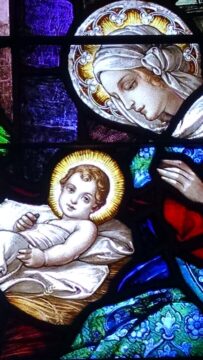 But Ahaz answered, “I will not ask! I will not tempt the LORD!”
But Ahaz answered, “I will not ask! I will not tempt the LORD!”
Then he said: “Listen, house of David! Is it not enough that you weary human beings? Must you also weary my God? Therefore the Lord himself will give you a sign; the young woman, pregnant and about to bear a son, shall name him Emmanuel.”” (Isaiah 7:11-14)
Ahaz was afraid of his own dreams and desires and did not want to ask God for a sign. However, God spoke to him of a sign – the birth of Emmanuel, a name that means “God-with-us.” This is the prophecy of the coming of the Messiah, the Christ, who will come to save his people. (Photo: Most Precious Blood, New London, Wisconsin)
In the New Testament, there are various stories of God inviting distinct individuals to assume important roles in salvation history. By means of an angel, God invited Mary to be the Mother of his Son. The Angel explained to Mary, “The Holy Spirit will come upon you, and the power of the Most High will overshadow you. Therefore, the child to be born will be called holy, the Son of God.” (Luke 1:35) Mary replied, “Behold, I am the handmaid of the Lord. May it be done to me according to your word.” (Luke 1:38)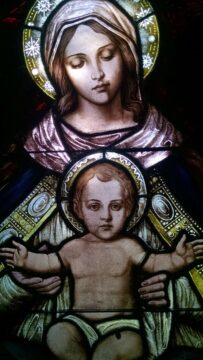
God invited Joseph to accept Mary as his wife. When Mary was betrothed to Joseph, but before they lived together, she was found to be with child. Joseph, confused and disillusioned, planned to divorce her quietly. However, an angel appeared to him in a dream and said, “Joseph, son of David, do not be afraid to take Mary your wife into your home. For it is through the Holy Spirit that this child has been conceived in her. She will bear a son and you are to name him Jesus, because he will save his people from their sins.” (Matthew 1:20-21)
The Gospels also tell us the story of John the Baptist, the one, who called the people to prepare the way of the Lord. John was a prophet of the desert, who preached in the region of the Jordan River. Using the words of the prophet Isaiah, John cried out, “Prepare the way of the Lord, make straight his paths.” (Mark 1:3)
John preached to the people, admonishing them to change their lives and to demonstrate the fruits of a sincere conversion. Many approached him to receive a baptism of conversion, and John taught them the importance of changing their hearts and acting justly. He invited them to recognize their sinfulness and to ask pardon of God. He taught them how to prepare the way of the Lord. Conversion prepares a space in the heart for God. To receive the grace of God in the heart, it is necessary first to purify it in order to prepare a place for the Savior.
Of course, when it comes to invitation, the central figure in the Gospels is Jesus. He invited people to be his disciples saying, “Follow me.” (Photo: Holy Family, Fond du lac, Wisconsin)
The Mass as an Encounter with Christ
God continues to invite us to share his happiness. He invites us to his banquet – the Sunday Mass. Sunday is a special day to worship our God as a community of faith. It is a true gift from God. We Catholics understand the gift of the Sunday Mass as the source and summit of our lives.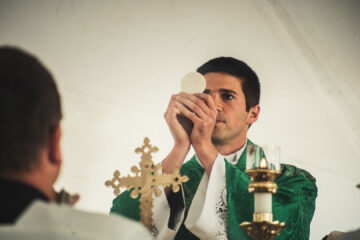
Every Sunday, we have the opportunity to encounter Christ, risen and living among us. We encounter him in the Word of God proclaimed. We encounter him in the Eucharist that we share. We encounter him in the moment of Communion, when we receive his Body and Blood before the altar of God together with our brothers and sisters in faith. We receive the Body of Christ in order to be transformed into his mystical Body in this world. God continues to invite us to the banquet of the Eucharist, and often he does so through the example and invitation of faith-filled individuals. (Photo: Milwaukee Ballpark of Faith, Pete Fenelon)
Invitation to the Gift of Sunday
We, the baptized, are disciples of Jesus Christ, and God invites us to be missionary disciples. All missionaries have the responsibility to invite others to experience the love and happiness that God offers. There are many, who have never experienced this happiness, because no one invited them. Our responsibility and privilege as missionary disciples is to invite our brothers and sisters to the Sunday Mass.
I offer a challenge to each of you. During this Advent season, invite at least one person, who normally does not attend church, to accompany you to the Sunday Mass. In this way, you will be a true missionary, leading a brother or a sister to an encounter with Jesus Christ, the Son of the living God.

